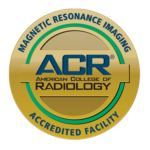KNOWING WHEN A BREAST MRI IS RIGHT FOR YOU
Your healthcare provider has recommended you for a non-invasive breast MRI. MRI offers valuable information about many breast conditions that other imaging modalities, such as mammography or ultrasound, cannot obtain.
Please note that MRI of the breast is not a replacement for mammography or ultrasound imaging but rather a supplemental tool that has many important uses. Our team of sub-specialized physicians utilizes it for the following:
- Screening in women at high risk for breast cancer or with a personal history of cancer
- Determining the extent of cancer after a new diagnosis of breast cancer
- Evaluating hard to asses abnormalities seen on a previous mammogram
- Assessing treatment response to chemotherapy
- Evaluating breast implants
MRI uses strong magnets instead of radiation to create detailed images of your breasts. Unlike mammograms or breast ultrasounds, contrast dye injected into your vein through an IV is usually required unless the study is being performed only to evaluate breast implants. This helps make any abnormal area in the breasts easier to see.
WHAT TO EXPECT:
If you are claustrophobic (fearful of small, enclosed areas) or experience pain when lying on your front for up to 30 minutes, your referring physician may prescribe a relaxant or pain medication to help you through the exam. Please let us know of any concerns you have regarding scheduling your appointment so we can make sure you have what you need to complete your exam successfully.
We don’t anticipate a long wait time; however, we want to make any waiting time as pleasant as possible. Consider bringing your favorite magazine, book, or music with headphones to help you pass the time.
Unless you are told otherwise, take all additional medications as usual.
Please leave your jewelry and valuables at home.
You will be asked to wear a gown and scrub bottoms during the exam.
Please tell the technologist, radiology nurse and/or radiologist of any allergies you may have and if you are pregnant or nursing.
You will be asked to fill out a questionnaire that will determine if an MRI is safe for you. People with various implants (usually metallic), body piercings, or metal in their bodies (including some tattoos) may have difficulty with an MRI – which utilizes a strong magnetic field. The imaging team needs to be informed of any of these potential problems.
An IV will be started in the event contrast is to be utilized
You will get a thorough explanation of the procedure, and we will answer any questions you may have before you are asked to sign your consent form for the exam.
An MRI machine consists of a large cylinder-shaped tube with a moveable table that slides into the center of the machine. For this exam, you will be asked to lie face down on the scanning table with your breast in a special device known as a coil. The coil is used to improve image quality and is designed for optimal patient comfort. You will rest your forehead on a headrest, and your arms will rest above your head.
The scanning table will slide your whole body into the magnet.
Breast imaging is very sensitive to motion, and even the slightest movement may cause inaccurate findings. It is very important that you make yourself comfortable and lay motionless until the exam is complete.
During the scan, you will not feel anything but will hear intermittent humming, thumping, clicking, and knocking sounds.
Headphones and/or earplugs will be provided to help mask the noise and to allow you to listen to music.
If contrast is used, the contrast agent (gadolinium) is injected into a vein in the arm, which may cause a cool sensation.
You will be given an emergency squeeze ball and can alert the technologist if you have an urgent need to stop.
The technologist will be visually monitoring you throughout the duration of the exam.
The MRI takes approximately 20-30min.
It is only necessary to have a driver if your referring doctor prescribed sedation medication for this exam.
There are no restrictions placed upon you. You may eat or drive as normal.
A radiologist will examine your images, and your report will be sent to your healthcare provider. Your healthcare provider will review the results with you. You may also get a copy of your report through the IMI patient portal.
For more information on Breast MRI visit www.radiologyinfo.org.

